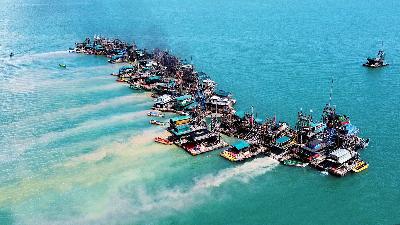Tin Vanishes, Humans and Nature Perish
Monday, April 22, 2024
The mining of tin causes serious environmental damage in Bangka Belitung. The number of children with intellectual disabilities and autism is on the rise.
arsip tempo : 174692601855.

AN investigation into corruption over illegal tin mining in Bangka Belitung with potential losses to the state totaling Rp271 trillion has shed more light on the shoddy way that our mining of this commodity has been managed. As well as the matter of economics, a significant and no less worrying threat is the human impact as a result of contamination from heavy metals.
The Attorney General’s Office (AGO) has uncovered illegal practices in the mining of tin in Bangka Belitung that have been continuing for a long time. This young province with a land area of 1.64 million hectares and maritime area of 6.53 million hectares has for decades had a large number of tin mines. The AGO calculation of potential losses to the state of Rp271 trillion is the accumulation of damage to the environment and the economy, and the cost of putting right the damage caused by illegal mining.
These losses are only a fraction of the massive environmental impact resulting from this tin mining because investigators only examined mining activities on land, and did not include mining at sea, which has a far higher value. For a long time, tin has been extracted using suction vessels and pontoons that can reach a depth of 40 meters.
This method of mining is highly destructive. According to a 2017 analysis of satellite imagery by the Bangka Belitung branch of environmental organization Walhi, only 12,470 hectares of coral reefs remained, a drastic fall from the area of 82,250 hectares in 2015. This brutal mining activity has also resulted in the loss of mangrove forests on the Bangka Belitung coastline. In the last 20 years, at least 240,460 hectares of mangrove have disappeared.
This loss of mangrove has led to conflict between people and crocodiles, who have lost their habitat. According to the South Sumatra Natural Resources Conservation Agency, in the last five years, there have been 127 attacks on humans by crocodiles in Bangka Belitung Islands. The estimates of losses do not include the effects on human health caused by the 12,600 mining pits covering a total of 15,580 hectares. The water that collects in these pits and becomes mixed with tailings containing heavy metals is consumed either directly or indirectly by local people.
Moreover, the AGO’s version of the calculation of losses does not include retired miners who have died as a result of exposure to silica dust that subsequently caused the lung disease silicosis. Most recently, a survey carried out by the Belitong UNESCO Global Geopark Management Agency showed that a large number of children at the Manggar State School for the Disabled, East Belitung, have intellectual disabilities or autism. Of the 123 students, 65 have mild intellectual disabilities, 10 have moderate intellectual disabilities and 17 have autism. The majority of these children are from the families of tin mine workers.
All of these problems are a direct consequence of the unsafe extractive mining policy that the government is still implementing. This misguided policy is being increasingly applied because President Joko Widodo is pushing for the downstreaming of the mineral sector. This is despite the fact that in many other countries this mistaken policy has long been abandoned. They are very strict in implementing environmental restoration rules and post-mining impact mitigation. We should learn from them.











